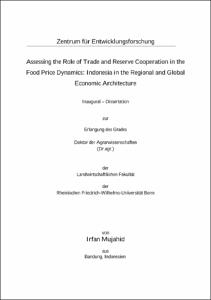Mujahid, Irfan: Assessing the Role of Trade and Reserve Cooperation in the Food Price Dynamics : Indonesia in the Regional and Global Economic Architecture. - Bonn, 2016. - Dissertation, Rheinische Friedrich-Wilhelms-Universität Bonn.
Online-Ausgabe in bonndoc: https://nbn-resolving.org/urn:nbn:de:hbz:5n-43379
Online-Ausgabe in bonndoc: https://nbn-resolving.org/urn:nbn:de:hbz:5n-43379
@phdthesis{handle:20.500.11811/6607,
urn: https://nbn-resolving.org/urn:nbn:de:hbz:5n-43379,
author = {{Irfan Mujahid}},
title = {Assessing the Role of Trade and Reserve Cooperation in the Food Price Dynamics : Indonesia in the Regional and Global Economic Architecture},
school = {Rheinische Friedrich-Wilhelms-Universität Bonn},
year = 2016,
month = apr,
note = {The dissertation discusses the potential roles of trade and food reserve cooperation among countries in pursuing more stable food prices, with a special focus on Indonesia. The study starts by analyzing food price movements in Indonesia and proposes a new approach in detecting food price crisis in the country. Using monthly retail rice prices from the 25 major markets in Indonesia, the key markets whose price movements can help to forecast price movements in all other markets are identified using granger-causality tests that are conducted under the vector error correction model framework. The relevance of monitoring the key markets in detecting price crisis is tested using Probit and Poisson models. The study found that albeit not all of alert phases lead to crises, monitoring the key markets can help to forecast price movements in all markets across the country.
The dissertation continues by reviewing the role of the Association of Southeast Asian Nations (ASEAN) cooperation in stabilizing food prices. The study found that reserve-based price stabilization policy has been an integral part of the development agenda of countries in Southeast Asia for decades and contributed to price stability which is associated with economic successes in the region. However, the operational cost for such policy is high and may result in economic inefficiency. Simulation shows that regional cooperation through risk sharing can significantly reduce the required stocks which will definitely reduce the costs of holding them. When transportation cost is considered due to decentralized storage in different countries, the study found that participating countries are still benefited from the cooperation.
Further, the dissertation investigates the role of the World Trade Organization (WTO) and Regional Trade Agreements (RTAs) in enhancing food trade at the global and regional market. The study employs the gravity model of international trade that is developed in a large panel data setting, which consists nearly all countries in the world. Empirical results suggest that the WTO and RTAs indeed have enhanced trade among the members, but not yet on the food sector. Only RTAs are found to have increased food trade among their member countries, whereas no evidence can be found that the WTO has also enhanced food trade among the members. Nevertheless, the study found that the WTO has promoted trade as well as food trade of the developing countries more than of the developed ones.},
url = {https://hdl.handle.net/20.500.11811/6607}
}
urn: https://nbn-resolving.org/urn:nbn:de:hbz:5n-43379,
author = {{Irfan Mujahid}},
title = {Assessing the Role of Trade and Reserve Cooperation in the Food Price Dynamics : Indonesia in the Regional and Global Economic Architecture},
school = {Rheinische Friedrich-Wilhelms-Universität Bonn},
year = 2016,
month = apr,
note = {The dissertation discusses the potential roles of trade and food reserve cooperation among countries in pursuing more stable food prices, with a special focus on Indonesia. The study starts by analyzing food price movements in Indonesia and proposes a new approach in detecting food price crisis in the country. Using monthly retail rice prices from the 25 major markets in Indonesia, the key markets whose price movements can help to forecast price movements in all other markets are identified using granger-causality tests that are conducted under the vector error correction model framework. The relevance of monitoring the key markets in detecting price crisis is tested using Probit and Poisson models. The study found that albeit not all of alert phases lead to crises, monitoring the key markets can help to forecast price movements in all markets across the country.
The dissertation continues by reviewing the role of the Association of Southeast Asian Nations (ASEAN) cooperation in stabilizing food prices. The study found that reserve-based price stabilization policy has been an integral part of the development agenda of countries in Southeast Asia for decades and contributed to price stability which is associated with economic successes in the region. However, the operational cost for such policy is high and may result in economic inefficiency. Simulation shows that regional cooperation through risk sharing can significantly reduce the required stocks which will definitely reduce the costs of holding them. When transportation cost is considered due to decentralized storage in different countries, the study found that participating countries are still benefited from the cooperation.
Further, the dissertation investigates the role of the World Trade Organization (WTO) and Regional Trade Agreements (RTAs) in enhancing food trade at the global and regional market. The study employs the gravity model of international trade that is developed in a large panel data setting, which consists nearly all countries in the world. Empirical results suggest that the WTO and RTAs indeed have enhanced trade among the members, but not yet on the food sector. Only RTAs are found to have increased food trade among their member countries, whereas no evidence can be found that the WTO has also enhanced food trade among the members. Nevertheless, the study found that the WTO has promoted trade as well as food trade of the developing countries more than of the developed ones.},
url = {https://hdl.handle.net/20.500.11811/6607}
}






